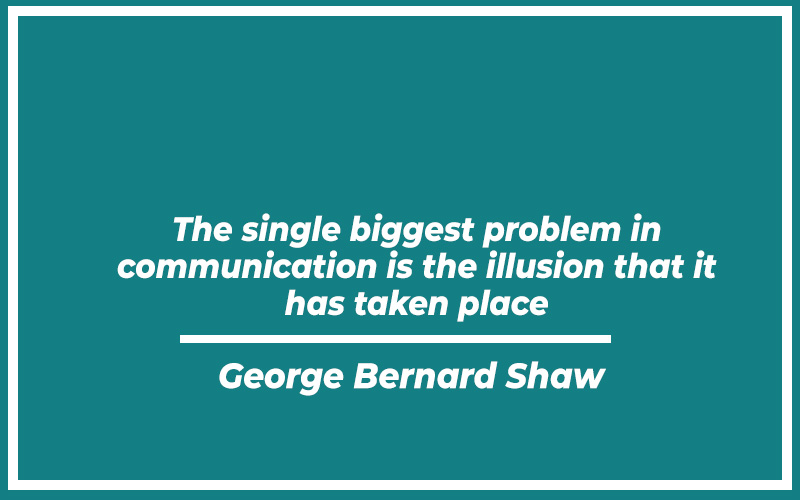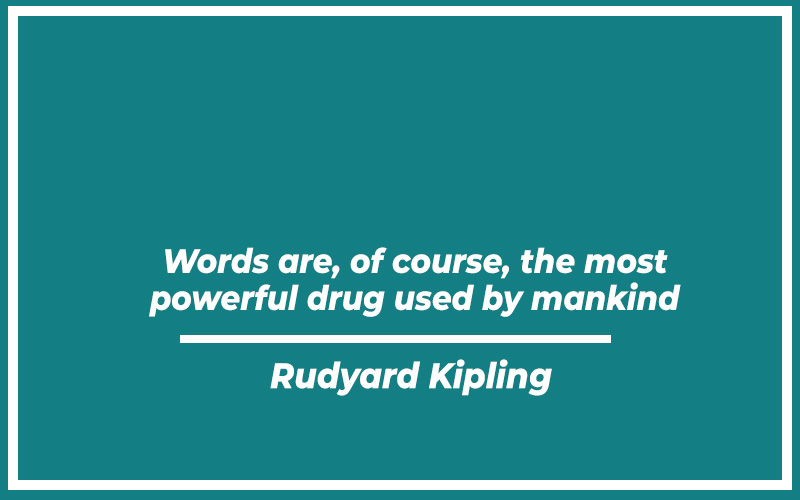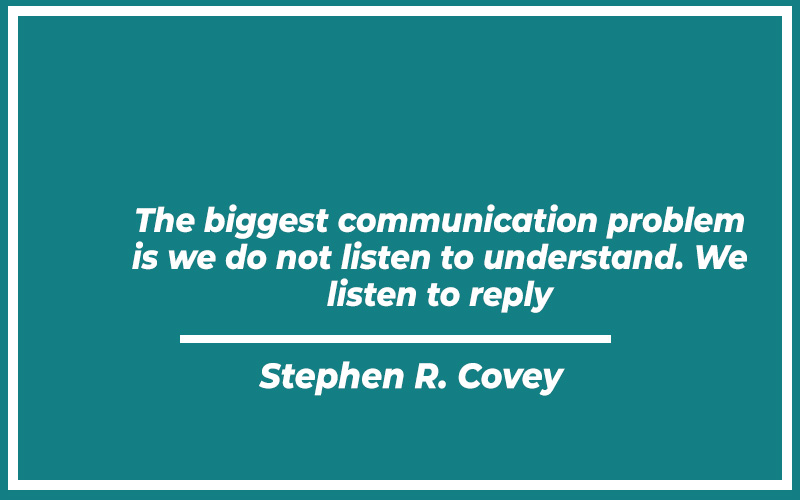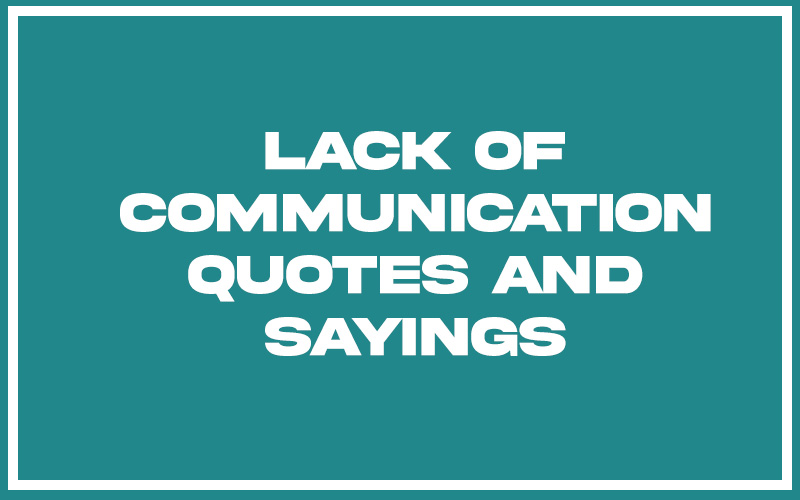Communication is key in any relationship, be it personal or professional. When there is a lack of communication, misunderstandings and conflicts often arise.
Quotes and sayings about the lack of communication highlight the importance of expressing our thoughts and feelings clearly.
These words of wisdom remind us that open and honest communication can prevent many issues and help build stronger connections with others.
Best Lack of Communication Quotes and Sayings

“The single biggest problem in communication is the illusion that it has taken place.” – George Bernard Shaw
Communication breakdowns often occur not because of a lack of effort, but because we mistakenly believe we have effectively communicated our message. This quote by George Bernard Shaw highlights a common issue in interactions: assuming that our message has been understood when it has not.
This illusion can lead to misunderstandings, conflicts, and missed opportunities. To combat this, it is crucial to seek feedback, ask clarifying questions, and confirm understanding to ensure that the intended message has truly been received and comprehended.
Also Read: Cutting People Off Quotes (with Explanation)
“We have two ears and one mouth so that we can listen twice as much as we speak.” – Epictetus
Epictetus’ words emphasize the importance of listening in effective communication. Many communication issues arise because individuals focus more on speaking than on listening.
By prioritizing listening, we can better understand others’ perspectives, respond more thoughtfully, and build stronger relationships. This quote serves as a reminder that communication is not just about expressing our own thoughts but also about genuinely hearing and understanding others.
“The most important thing in communication is hearing what isn’t said.” – Peter Drucker
Peter Drucker’s quote underscores the significance of non-verbal communication. Often, what is not said can be just as important, if not more so, than the words themselves.
Non-verbal cues such as body language, facial expressions, and tone of voice can convey feelings and intentions that words alone cannot. Being attuned to these subtle signals can enhance our understanding and help us respond more empathetically and effectively.
“Communication works for those who work at it.” – John Powell
Effective communication requires effort and intentionality, as John Powell suggests. It is not something that happens automatically but needs continuous work and dedication.
Whether in personal relationships or professional settings, investing time and energy into improving communication skills—such as active listening, clear articulation, and empathy—can lead to more meaningful and productive interactions.
“Words are, of course, the most powerful drug used by mankind.” – Rudyard Kipling
Rudyard Kipling’s quote highlights the immense power of words. They can heal, inspire, hurt, or deceive, making communication a potent tool.
Recognizing the impact of our words can encourage us to choose them carefully and thoughtfully. Understanding this power can help mitigate misunderstandings and foster a more compassionate and effective exchange of ideas.
“Good communication is as stimulating as black coffee, and just as hard to sleep after.” – Anne Morrow Lindbergh
Anne Morrow Lindbergh likens good communication to a strong cup of coffee—invigorating and impactful. Effective communication can stimulate thoughts, inspire action, and leave a lasting impression.
This comparison reminds us that engaging in meaningful conversations can energize us and lead to significant insights and changes. It also implies that impactful communication can keep us awake, pondering the ideas shared long after the conversation ends.
“Speak when you are angry and you will make the best speech you will ever regret.” – Ambrose Bierce
Ambrose Bierce’s quote serves as a caution against speaking in anger. Words spoken in the heat of the moment are often regrettable and can damage relationships.
This saying underscores the importance of managing emotions and choosing the right time and manner to communicate. Taking a moment to cool down before speaking can prevent unnecessary conflicts and foster more constructive and respectful interactions.
“The single biggest problem in communication is the illusion that it has taken place.” – George Bernard Shaw
Communication breakdowns often occur not because of a lack of effort, but because we mistakenly believe we have effectively communicated our message. This quote by George Bernard Shaw highlights a common issue in interactions: assuming that our message has been understood when it has not.
This illusion can lead to misunderstandings, conflicts, and missed opportunities. To combat this, it is crucial to seek feedback, ask clarifying questions, and confirm understanding to ensure that the intended message has truly been received and comprehended.
“We have two ears and one mouth so that we can listen twice as much as we speak.” – Epictetus
Epictetus’ words emphasize the importance of listening in effective communication. Many communication issues arise because individuals focus more on speaking than on listening.
By prioritizing listening, we can better understand others’ perspectives, respond more thoughtfully, and build stronger relationships. This quote serves as a reminder that communication is not just about expressing our own thoughts but also about genuinely hearing and understanding others.
“The most important thing in communication is hearing what isn’t said.” – Peter Drucker
Peter Drucker’s quote underscores the significance of non-verbal communication. Often, what is not said can be just as important, if not more so, than the words themselves.
Non-verbal cues such as body language, facial expressions, and tone of voice can convey feelings and intentions that words alone cannot. Being attuned to these subtle signals can enhance our understanding and help us respond more empathetically and effectively.
“Communication works for those who work at it.” – John Powell
Effective communication requires effort and intentionality, as John Powell suggests. It is not something that happens automatically but needs continuous work and dedication.
Whether in personal relationships or professional settings, investing time and energy into improving communication skills—such as active listening, clear articulation, and empathy—can lead to more meaningful and productive interactions.

“Words are, of course, the most powerful drug used by mankind.” – Rudyard Kipling
Rudyard Kipling’s quote highlights the immense power of words. They can heal, inspire, hurt, or deceive, making communication a potent tool.
Recognizing the impact of our words can encourage us to choose them carefully and thoughtfully. Understanding this power can help mitigate misunderstandings and foster a more compassionate and effective exchange of ideas.
“Good communication is as stimulating as black coffee, and just as hard to sleep after.” – Anne Morrow Lindbergh
Anne Morrow Lindbergh likens good communication to a strong cup of coffee—invigorating and impactful. Effective communication can stimulate thoughts, inspire action, and leave a lasting impression.
This comparison reminds us that engaging in meaningful conversations can energize us and lead to significant insights and changes. It also implies that impactful communication can keep us awake, pondering the ideas shared long after the conversation ends.
“Speak when you are angry and you will make the best speech you will ever regret.” – Ambrose Bierce
Ambrose Bierce’s quote serves as a caution against speaking in anger. Words spoken in the heat of the moment are often regrettable and can damage relationships.
This saying underscores the importance of managing emotions and choosing the right time and manner to communicate. Taking a moment to cool down before speaking can prevent unnecessary conflicts and foster more constructive and respectful interactions.
“The most important thing in communication is to hear what isn’t being said.” – Peter Drucker
Peter Drucker emphasizes the value of understanding unspoken messages in communication. Often, non-verbal cues, such as body language and facial expressions, reveal more than words.
Paying attention to these signals helps us grasp the full context and emotional undertone of a conversation. By being attentive to what isn’t explicitly stated, we can respond more empathetically and accurately, fostering deeper connections and avoiding misunderstandings that arise from focusing solely on verbal communication.
“The art of communication is the language of leadership.” – James Humes
James Humes highlights the critical role communication plays in effective leadership. Leaders must convey their vision, inspire others, and foster collaboration, all of which require strong communication skills.
This quote reminds us that leadership isn’t just about making decisions or setting direction; it’s also about articulating ideas clearly and motivating people. Effective leaders listen, provide feedback, and create an environment where open and honest communication thrives, thereby driving success and innovation within their teams.
“Effective communication is 20% what you know and 80% how you feel about what you know.” – Jim Rohn
Jim Rohn’s quote emphasizes the importance of passion and conviction in communication. Knowledge alone isn’t enough; how we convey that knowledge significantly impacts our effectiveness.
When we speak with genuine enthusiasm and confidence, we engage and persuade our audience more effectively. This highlights the emotional aspect of communication, where our feelings about the subject matter can enhance our message’s impact and resonance, making it more memorable and compelling.
“To listen well is as powerful a means of communication and influence as to talk well.” – John Marshall
John Marshall underscores the power of listening in communication and influence. Active listening demonstrates respect and understanding, building trust and rapport. When we listen attentively, we gain valuable insights and can respond more appropriately, fostering meaningful dialogue.
This quote reminds us that effective communication isn’t just about expressing our thoughts but also about being receptive to others’ perspectives, which can enhance our influence and strengthen our relationships.
“Good words are worth much, and cost little.” – George Herbert
George Herbert’s quote highlights the value of kind and thoughtful communication. Words have the power to uplift, encourage, and inspire, often requiring little effort or expense.
By choosing our words carefully and speaking with kindness, we can positively impact others and build stronger connections. This quote serves as a reminder that even small, positive interactions can have significant effects, and that we should strive to use our words to spread goodwill and understanding.
“The way we communicate with others and with ourselves ultimately determines the quality of our lives.” – Tony Robbins
Tony Robbins emphasizes that communication shapes our experiences and relationships. How we interact with others and ourselves influences our emotional well-being, self-perception, and success.
Positive and effective communication can lead to fulfilling relationships and personal growth, while poor communication can result in conflict and dissatisfaction. This quote underscores the importance of developing strong communication skills to enhance the quality of our lives and achieve our personal and professional goals.
“You can change your world by changing your words.” – Joel Osteen
Joel Osteen’s quote highlights the transformative power of language. By choosing positive and constructive words, we can shift our mindset and influence our environment. Our words can inspire, motivate, and create a more optimistic outlook, leading to better outcomes and relationships.
This quote encourages us to be mindful of our language, recognizing that our choice of words can shape our reality and the experiences of those around us, ultimately empowering us to create positive change.
“Communication leads to community, that is, to understanding, intimacy, and mutual valuing.” – Rollo May
Rollo May’s quote emphasizes the role of communication in building strong communities. Effective communication fosters understanding, closeness, and appreciation among individuals.
By sharing our thoughts and listening to others, we create bonds that strengthen social ties and promote mutual respect. This quote highlights that communication is not just an exchange of information but a tool for creating meaningful connections and a sense of belonging, which are essential for a cohesive and supportive community.
“The single biggest problem in communication is the illusion that it has taken place.” – George Bernard Shaw
George Bernard Shaw’s insight points to a common communication pitfall: assuming that our message has been understood without verification. This illusion can lead to significant misunderstandings and errors.
Effective communication requires not just delivering a message but also ensuring that it has been accurately received and comprehended. This quote reminds us to seek feedback and confirmation, thus bridging gaps in understanding and fostering clearer, more effective exchanges.
“The most important thing in communication is hearing what isn’t said.” – Peter Drucker
Peter Drucker emphasizes the importance of perceiving unspoken messages in communication. Non-verbal cues such as body language, facial expressions, and tone often convey more than words.
Being attuned to these signals helps us understand the full context and emotions behind the words, leading to more empathetic and effective communication. This quote underscores that true comprehension goes beyond hearing words; it involves sensing the underlying feelings and intentions.
“Assumptions are the termites of relationships.” – Henry Winkler
Henry Winkler’s quote highlights the destructive nature of assumptions in relationships. When we assume rather than communicate openly, misunderstandings and resentment can fester, undermining trust and connection.
This quote serves as a reminder that clear, honest communication is vital to maintaining healthy relationships. By avoiding assumptions and seeking clarity through dialogue, we can prevent the erosion of trust and foster stronger, more resilient connections.
“The most important thing in communication is hearing what isn’t said.” – Peter Drucker
Peter Drucker’s quote underscores the value of understanding unspoken messages in communication. Often, non-verbal cues, such as body language and facial expressions, reveal more than words. Paying attention to these signals helps us grasp the full context and emotional undertone of a conversation.
By being attentive to what isn’t explicitly stated, we can respond more empathetically and accurately, fostering deeper connections and avoiding misunderstandings that arise from focusing solely on verbal communication.
“Kind words can be short and easy to speak, but their echoes are truly endless.” – Mother Teresa
Mother Teresa’s quote highlights the lasting impact of kind words. Even simple, positive expressions can have profound and enduring effects on others. This quote encourages us to recognize the power of kindness in our communication.
By speaking kindly, we can uplift, inspire, and create a ripple effect of goodwill. The echoes of kind words can resonate far beyond the moment they are spoken, fostering a more compassionate and connected world.

“The biggest communication problem is we do not listen to understand. We listen to reply.” – Stephen R. Covey
Stephen R. Covey’s quote addresses a fundamental issue in communication: listening with the intent to respond rather than to understand. This approach can hinder meaningful dialogue and lead to misunderstandings.
Effective communication requires active listening, where we fully engage with the speaker’s message before formulating a response. This quote reminds us to prioritize understanding over immediate reaction, fostering deeper connections and more productive conversations.
Also Read: Tina Turner Quotes (with Explanation)
Final Thoughts
In summary, lack of communication quotes and sayings show how important it is to communicate clearly and openly in our everyday lives. They remind you that many misunderstandings and conflicts happen because we do not talk things through.
These wise sayings encourage you to speak up, listen carefully, and connect better with others to avoid unnecessary issues. Communication is not just about words; it is about creating understanding and trust.

